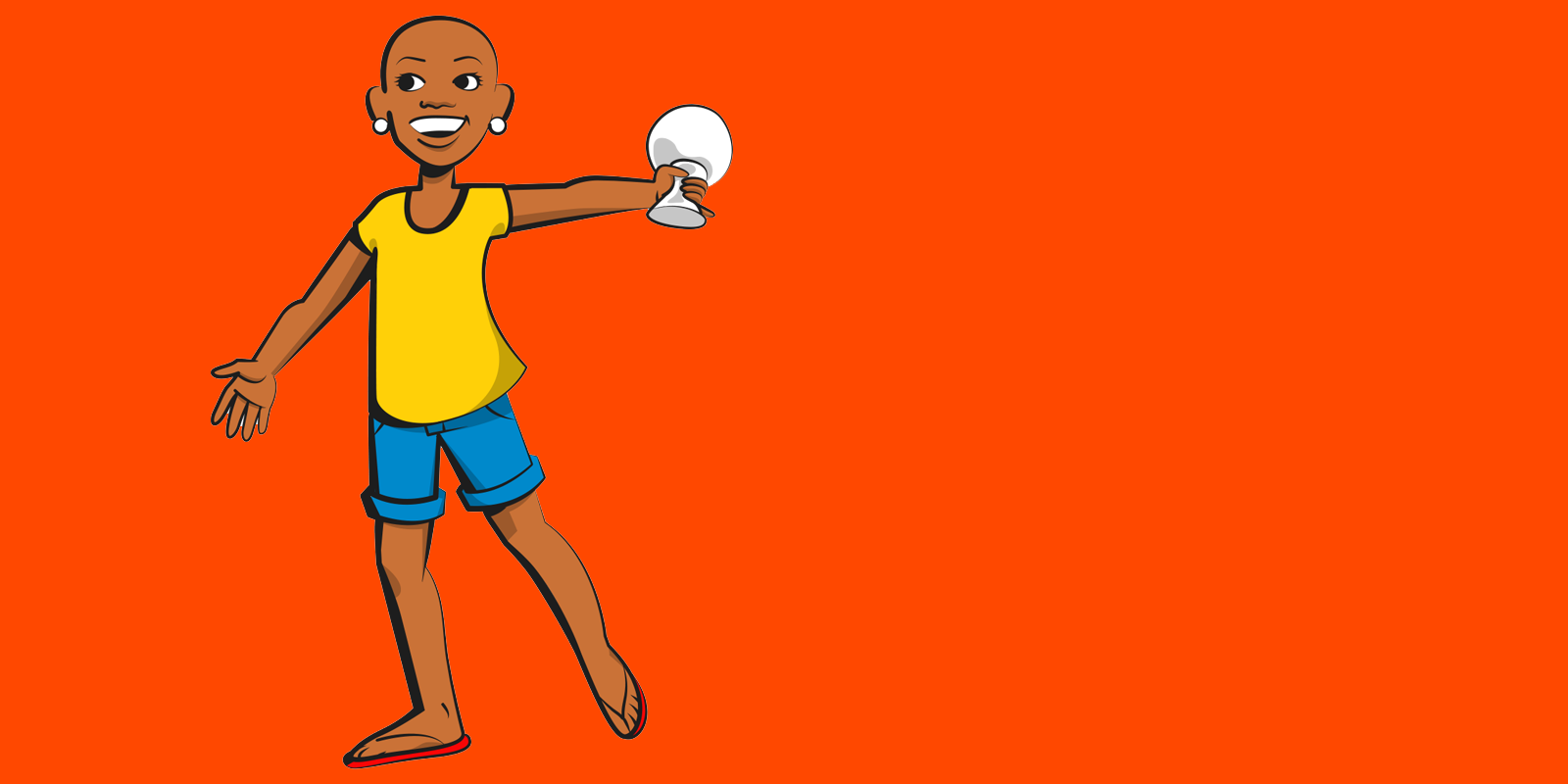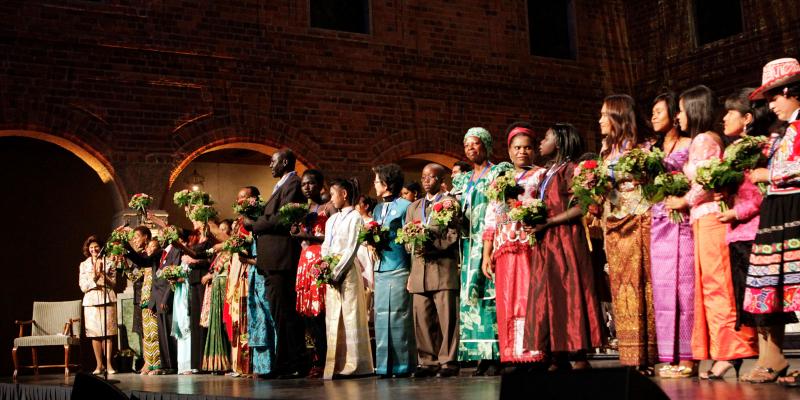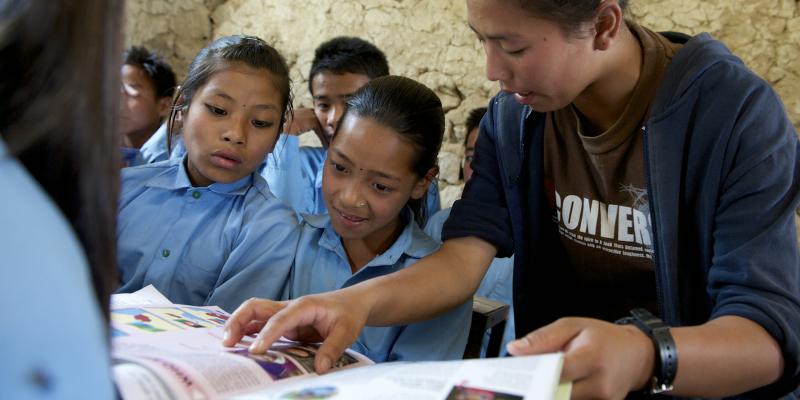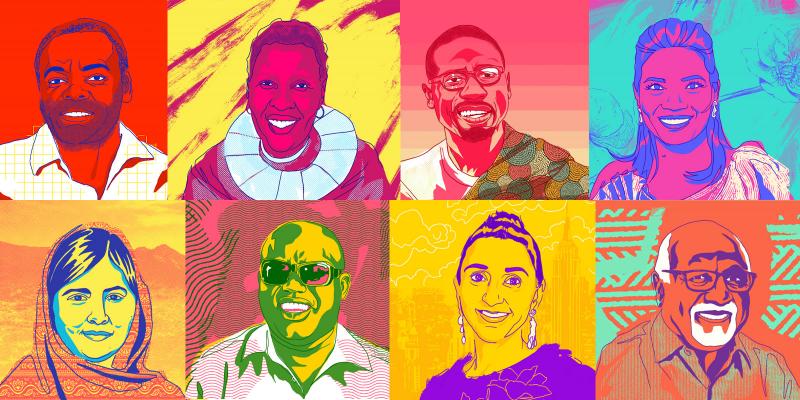
The World's Children's Prize for the Rights of the Child and related awards have been awarded to amazing Child Rights advocates since the year 2000.
During the first few years, the WCP Child Jury voted to give out their own ward. In later years, however, the person or organization who gets the majority of the votes from children receive The World's Children's Prize for the Rights of the Child, while the remaining two candidates receive the World Children's Honorary Award. All three are Child Rights Heroes and are given prize money to use in their work for children. Below, check the year to see which Child Rights heroes were honoured then.
World’s Children’s Honorary Award
Barefoot College, India, for their 40+ years of pioneering efforts, including their creation of a Children’s Parliament, education so-called "barefoot teachers" from rural areas to teach in evening schools giving working children, especially girls, the chan ce to an education.
Children’s Peace Movement, Colombia, for empowering children to campaign against war and organizing activities to bring happiness and peace. Children took the lead in promoting peace and empowering their friends to demand the right of young people to live a good life, free from violence.
The Child Jury Award
Maiti Nepal for fighting exploitation and trafficking of vulnerable girls from Nepal to India where they were forced to work as slaves in brothels. They rescue girls affected by trafficking and offer rehabilitation and education. Many of the girls are empowered as changemakers. Maiti also works with prevention to stop girls from being lured by traffickers and runs a home and a hospital for affected girls.
World’s Children’s Honorary Award
Casa Allianza, Central America, provide care and protection for children who have experienced extraordinary trauma, including abuse, neglect, violence, abandonment, substance addiction, sexual exploitation and human trafficking.
The Child Jury Award
James Aguer, Sudan for freeing thousands of kidnapped children from slavery in South Sudan. James was imprisoned more than 30 times and saw four of his coworkers murdered – all for their stubborn fight against children being kidnapped by armed militia, and forced to work, sleep outdoors with the animals and badly abused.
World’s Children’s Honorary Award
Pastoral da Criança’s, Brazil, for engaging more than 150,000 volunteers in work to reduce infant mortality and malnutrition among poor children. Pastoral da Criança’s teach families how to take better care of children and give extra support to those who need it. They also work against violence against women and children.
Paul and Mercy Baskar, India, for fighting against hazardous child labour and slavery. Their organisation Peace Trust empowers children with education on their rights. They put pressure on factory owners to not employ children; demand that politicians enforce the ban on child labour; and organise protests against child labour, for child rights.
Liz Gaynes and Emani Davis, USA, for their work defending the rights of children of prisoners. Emani was six years old when her father was sentenced to 107 years in prison. She and her mother Liz, a human rights lawyer, made pioneering efforts through the Osborne Association and as independent child rights advocates. Tens of thousands of children and their parents have been helped by parenting programmes, children’s centers in prison and post-release services.
Graca Machel was awarded for her long struggle for children’s rights, especially girls’ equal rights. Graça also fights against all forms of violence and abuse against children. On a global scale, Graça has worked to help child victims of war and to stop the trafficking of children in many ways, including as a member of the Elders group.
The Child Jury Award
Dunga Mothers, Kenya for their unpaid and difficult struggle to help children who have lost their parents to AIDS. These are children who could otherwise end up living on the streets, facing a life of drugs, violence, crime and commercial sexual exploitation. The Mothers have fought for the rights of orphaned children to have the same opportunities in life as other children.
World’s Children’s Honorary Award
Ana María Marañon de Bohorquez, Bolivia, for working selflessly for street children in Cochabamba, Bolivia. Many of these children have parents who were once street children themselves. With street life comes violence and drugs, but Ana María is determined to give all children a chance for a better life.
The Child Jury Award
AOCM, Rwanda, for the tireless work by and for children orphaned by the 1994 genocide in Rwanda. The organisation was founded by children and young people who lost family members in the genocide, to help each other create a better life. They supported each other living together in child-headed households, sharing both material things and love.
World’s Children’s Honorary Award
Jetsun Pema, Tibet, who since arriving to India as a refugee with her brother, the Dalai Lama, has fought for the rights of Tibetan refugee children. Tens of thousands of children have been helped through TCV. Some are orphans while others have been sent by their parents to escape the oppression and poverty in Chinese-controlled Tibet. In her Tibetan children’s villages, youngsters are provided a loving home. and the chance to go to school and speak their language.
World’s Children’s Honorary Award
Dr. Cynthia Maung, Burma, for fighting for health and education for hundreds of thousands of refugee children suffering due to the military dictatorship in Myanmar/Burma. Cynthia, originally from Myanmar, founded the Mae Tao Clinic in Thailand in 1989, offering free healthcare to refugees and migrants, most of whom are children. The clinic also trains travelling medics who return in secret to Myanmar.
Inderjit Khurana, India, for running over 100 schools and child helplines for some of India’s poorest children – those who live and work on or near train stations. Inderjit believed that if a child cannot come to school, the school has to come to the child. She and Ruchika ran classrooms at train platforms and provided education and promoted good health and self-esteem.
World’s Children’s Honorary Award
Josefina Condori, Peru, for fighting for indigenous girls that are forced to work as maids in private homes, often under slave-like conditions. Many of these domestic workers face violence and abuse. Josefina, who was a maid herself as a child, founded Yanapanakusun, an organization that runs a home for vulnerable girls and a center for domestic workers.
Agnes Stevens, USA, for buiking a movement – School on Wheels – that support children living in homelessness, often with their mothers, to go to school and get a good education. Since they have to move around a lot and chnage schools, volounteer tutors help till them with homework and wherever the child goes, the tutor follows.
World’s Children’s Honorary Award
Monira Rahman, Bangladesh, for her courageous fight to put an end to acid and petrol violence in Bangladesh. Most of those affected are girls, but women, boys, and men are also victims. Her organization has helped survivors live active lives with dignity, through everything from plastic surgery to education and raised awareness .
Cecilia Flores-Oebanda, the Philippines, for tirelessly working to rescue and rehabilitate children affected by slave labour and trafficking. Cecilia founded the organization We Are Free, rescuing and supporting tens of thousands of children. They also conduct preventative work and have trained partners to combat trafficking, including judges, prosecutors, police, travel agencies, and teachers.
World’s Children’s Honorary Award
Sakena Yacoobi, Afghanistan, for her long and dangerous struggle to fulfil Afghan children and women’s rights to education, and healthcare, and to learn about their rights. Her organization, Afghan Institute of Learning (AIL), first opened secret schools in 1995, when the Taliban regime banned girls from going to school. Since then, they have fought for all childrens right to going to school, traning teachers and giving Afghan children opportunities and hope despite decades of war.
Ann Skelton, South Africa, for her long and successful fight for the rights of children affected by the criminal justice system. Ann's groundbreaking work for South Africa’s children have made a difference in courtrooms and laws, children's detention centers, schools and for unaccompanied refugee children as well as in custody battles.
World’s Children’s Honorary Award
Sompop Jantraka, Thailand, for fighting the commercial sexual exploitation of children and fighting for the rights of vulnerable children in the Mekong region. Sompop grew up in poverty and started working at the age of six. Now, he has given thousands of poor children throughout the Mekong Region protection and education.
Kimmie Weeks, Liberia, for fighting for the rights of children affected by war and poverty. When Kimmie was 16, he organized a campaign to rescue child soldiers in the civil war. This contributed to the liberation of 20,000 children. Kimmie went on to help vulnerable children, providing a home for orphans, rehabilitation of child soldiers, education, and healthcare.
World’s Children’s Honorary Award
John Wood, USA, for fighting poverty and giving children around the world the chance to go to school. John founded Room to Read, which haas built thousands of schools and school libraries in some of the world’s poorest countries. Room to Read has published thousands of children’s books in local languages, given away over ten million books, and empower girls with education on life skills.
Indira Ranamagar, Nepal, for fighting for the rights of the children of prisoners. Indira lets children stay at safe homes where they receive an education and a safe childhood. All the while, they keep in touch with their imprisoned parent. Indira also lobbies politicians and authorities to make prisons more humane, and to support families after a parent is released from prison.
Javier Stauring, USA, for bringing justice to children and families hurt in the criminal justice system, including victims of crime and young offenders. Javier and his organization, Healing Dialogue and Action, use reconciliation and dialogue instead of harsh punishment and revenge. Javier’s work has helped change laws and regulations that violated children’s rights.
Kailash Satyarthi, India, for his life time fight against child labour and debt slavery, and all children’s right to education. Kailash and his organizations rescue enslaved children, build homes where can be safe. Kailash has received death threats and two of his coworkers were killed for their work. They have freed nearly 100,000 children, and their ‘Global March Against Child Labor’ campaign has grown into a movement involving millions of people.
World’s Children’s Honorary Award
Rosi Gollmann, Germany, for her fight for the poorest and most vulnerable children in India and Bangladesh. TOgether with local partners, Rosi and her organization Andheri-Hilfe, have helped ten million people create a better future. 50,000 child labourers have been freed, and tens of thousands of children with disabilities have received support. The campaign ‘No girl is unwanted’, have stopped over 12,000 Indian girls from being killed at birth, instead getting support and an education.
Molly Melching, USA and Senegal, for her fight to end female genital mutilation (FGM), child marriage, and forced marriage. Molly and her organization Tostan involve whole villages, children, and adults alike, in a three-year training program that covers health, education, and environmental issues. The program includes empowering women and children and raising awareness of children’s rights.
World’s Children’s Honorary Award
Valeriu Nicolae, Romania, for his fight for the very poorest and most vulnerable children in Romania, including the Roma. Valeriu and his network tackle discrimination and racism, protecting the rights of children living in poverty. They give homework help and teach children about their rights. They also fight for laws and systems that protect children from hate crimes and strengthen their opportunities.
Gabriel Mejía Montoya, Colombia, for his more than 30-year struggle for Colombia’s vulnerable children—street children, former child soldiers, and children sentenced to prison. Father Gabriel's homes offer doctors, psychologists, and social workers supporting children that also access activities such as education, therapy, yoga, and meditation. They are taught good values, to show empathy, show respect and take responsibility.
World’s Children’s Honorary Award
Guylande Mésadieu, Haiti, for her work to support domestic slave children, street children, and children in prison. Guylande founded the organization Zanmi Timoun (Children’s Friend) to help vulnerable children in the major earthquake in 2010, when hundreds of thousands of children ended up on the street. Then families who had lost everything also gave up their children to slave labour.
Spès Nihangaza, Burundi, for her fight for Burundi’s orphans and most vulnerable children. Her organization FVS runs a boarding school, a center for street children, and clinics. Spès has also created a system of 1,700 solidarity groups in which villagers save money together, and orphans are placed in safe, loving homes. The savings fund is then used for micro loans to people wanting to start a small business, for healthcare, and for school uniforms and school materials.
World’s Children’s Honorary Award
Mohammed Rezwan, Bangladesh, for his fight for the rights of children, especially girls, to attend school despite flooding and poverty exacerbated by the climate crisis. Rezwan's boat schools and floating clinics ensures access to education even when schools and roads are destroyed by flooding annually. That allows children to continue in school instead of having to work or be married off.
Thích Nữ Minh Tú, Vietnam, for fighting for the rights of orphans and children living in poverty. After a childhood marked by war, she became a Buddhist nun. Her pagoda provides security, love, medicines, healthcare, and a place to play for orphans and other vulnerable children. They are assisted in obtaining birth certificates so that they can go to school, and get school materials, uniforms, and grants for higher education.
Related stories
Långgatan 13, 647 30, Mariefred, Sweden
Phone: +46-159-129 00 • info@worldschildrensprize.org
© 2020 World’s Children’s Prize Foundation. All rights reserved. WORLD'S CHILDREN'S PRIZE®, the Foundation's logo, WORLD'S CHILDREN'S PRIZE FOR THE RIGHTS OF THE CHILD®, WORLD'S CHILDREN'S PARLIAMENT®, WORLD'S CHILDREN'S OMBUDSMAN®, WORLD'S CHILDREN'S PRESS CONFERENCE® and YOU ME EQUAL RIGHTS are service marks of the Foundation.





